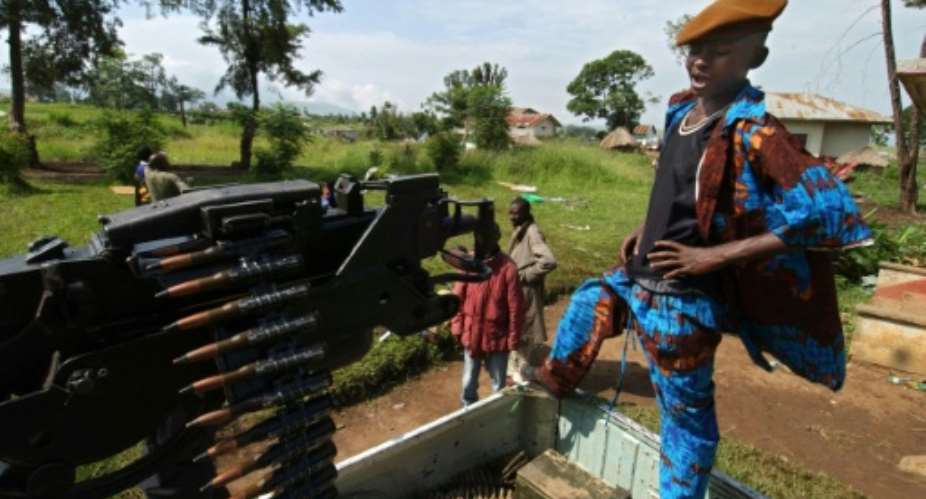The Hague (AFP) - "How do you calculate a lost childhood?" That was the question Tuesday before war crimes judges trying to set the amount of landmark reparations to be paid to former Congolese child soldiers.
After years of hearings, trials and appeals before the International Criminal Court (ICC), the victims of former Congolese warlord Thomas Lubanga are "tired of this battle," said lawyer Luc Walleyn.
"There is some damage which cannot be calculated. How do you calculate a lost youth? What it is worth? A million, half a million, five thousand euros, a thousand euros?" Walleyn asked the tribunal based in The Hague.
Transferred to the ICC in 2006, Lubanga was found guilty six years later of abducting children -- boys and girls -- as young as 11 and press-ganging them into his Union of Congolese Patriots (UPC) in the eastern Ituri region of the Democratic Republic of Congo.
He was jailed for 14 years. But the court also ruled that Lubanga is personally liable for reparations to his victims, who at the time of the crimes in 2002-2003 were all under the age of 15.
The reparations case was opened in 2012, but has bogged down as lawyers and experts have wrestled with the best way of ensuring that the victims -- many of whom are now in their 30s and have children of their own -- can be helped.
'Forgotten and highly vulnerable'
 The International Criminal Court in The Hague, Netherlands, is seeking to make its first ever reparations to the victims of war crimes, focusing on the pain suffered by child soldiers
The International Criminal Court in The Hague, Netherlands, is seeking to make its first ever reparations to the victims of war crimes, focusing on the pain suffered by child soldiers
The lengthy process of trying to identify victims, has also led to further trauma, with the former child soldiers asked to repeat "again and again what happened to them," said Walleyn.
"It's hard. There are men, for whom it is a childhood memory, but who cry when they talk about it."
Experts agreed that for many social isolation and stigmatisation was part of the victims' daily lives.
They are "often forgotten and highly vulnerable... suffering the life-long consequences of stigma," James Mehigan, counsel for Child Soldiers International, told the judges.
Many of the girls forced into the militia's ranks returned home with babies, only to find themselves ostracised by their communities and families. Deemed unworthy of marriage, they are condemned to live in poverty and isolation.
"Many have contemplated suicide," said Brigid Inder, from the Women's Initiatives for Gender Justice, adding the former young fighters often feel powerless "and the community rejection exacerbates their sense of pain".
For many "their greatest wish is to go back to school ... to learn and regain the respect of their communities," said Mehigan.
Living in fear
Many of the victims also fear reprisals if they speak out, as Lubanga is now serving the remainder of his term in a Congolese jail and is expected to be released by 2019.
Lubanga has never "acknowledged his crimes, or offered an apology," said Inder.
His UPC remains "an active political force in Ituri... and exerts considerable influence," she added.
The Trust Fund for Victims, an independent body set up to help administer ICC reparations, is seeking approval from the court for a three-year plan of projects to help rehabilitate the victims.
It has set aside 1 million euros ($1.1 million) to fund projects aimed at "reconciling the victims with their families and affected communities".
But experts argued the court should award a higher amount, and also stretch the scheme over five years to properly establish educational programmes, psychological counselling and specialised medical centres.
The fund's proposal was "manifestly insufficient", Inder said, suggesting between 1.5 million euros to 1.8 million euros annually for five years would be more appropriate.
She also suggested that the Congolese government should apologise publically for failing "to protect the children of Ituri".
A decision on the fund's programme and the total amount of the reparations will be made at a later date.
It is also not immediately clear how many victims are affected, as so far the fund has only been able to interview and assess 31 potential victims.
But it noted that some estimates say up to 3,000 children may have been recruited into Lubanga's militia at the time of the crimes.





 We’ll no longer tolerate your empty, unwarranted attacks – TUC blasts Prof Adei
We’ll no longer tolerate your empty, unwarranted attacks – TUC blasts Prof Adei
 Bawumia donates GHc200,000 to support Madina fire victims
Bawumia donates GHc200,000 to support Madina fire victims
 IMF to disburse US$360million third tranche to Ghana without creditors MoU
IMF to disburse US$360million third tranche to Ghana without creditors MoU
 Truck owner share insights into train collision incident
Truck owner share insights into train collision incident
 Paramount chief of Bassare Traditional Area passes on
Paramount chief of Bassare Traditional Area passes on
 Two teachers in court over alleged illegal possession of BECE papers
Two teachers in court over alleged illegal possession of BECE papers
 Sunyani: Victim allegedly shot by traditional warriors appeals for justice
Sunyani: Victim allegedly shot by traditional warriors appeals for justice
 Mahama vows to scrap teacher licensure exams, review Free SHS policy
Mahama vows to scrap teacher licensure exams, review Free SHS policy
 Government will replace burnt Madina shops with a new three-story, 120-store fac...
Government will replace burnt Madina shops with a new three-story, 120-store fac...
